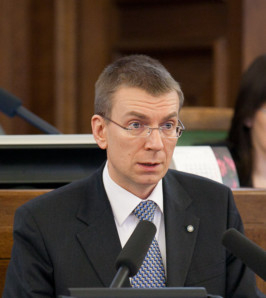
We are used to unpredictable weather on Europe’s front line. But now we Latvians see storm clouds gathering over our friends and allies too. Established beliefs about the rules-based international order on which our prosperity and freedom depend have been challenged. The result is the most severe test to the transatlantic alliance in our lifetime. It affects both Britain and Latvia — countries that share a common outlook, common values and common interests. We both consider the United States as our most important security partner.
This year is the centenary of America’s entry into the First World War — and the beginning of America’s role as a European security power: A happy alliance of common values and common interests. For my country, America has always been a beacon of hope. The world’s most powerful country was the best chance of defeating the Soviet regime. It also epitomised the world’s most important ideas: Liberty, the free market and the rule of law. Even in our darkest hours, we believed that those ideas would one day triumph. Like you, we continue to believe that Euro-Atlantic security is indivisible. There is no such thing as “Baltic security”.
Russia’s toxic cocktail of cyberattacks, subversion, propaganda, economic pressure and military intimidation is a threat to every member of the Nato alliance. We are reassured by the language we hear from senior figures in the US administration. America’s greatness stems not just from its strength at home. The US has more allies than any country has ever had. We are proud to be among them.
America is quite right to expect its European partners to do more, and we will rise to that challenge. We are rapidly increasing our defence spending, to reach the Nato target of 2 per cent of gross domestic product by 2018 — a level which the United Kingdom already meets. We appreciate Britain’s increased commitment to European security. The main part of Britain’s enhanced presence in the frontline states is in our neighbour, Estonia.
But we will give a warm welcome to the British personnel who come to Latvia for forthcoming military exercises. No one in Britain should be fooled by Russian propaganda: Nato is not recklessly “ramping up” its presence in its frontline member states. Nor are we hotheads eager for conflict. On the contrary, we have the most to lose. Our allies’ presence on our soil is not an aggressive move: It is simply a deterrent. Deterring attack is the best way of ensuring peace.
As we approach our centenary of statehood next year, we remember the sacrifice of the British soldiers and sailors whose service in the Baltic region at the end of the First World War was crucial in pushing back the German and Russian forces, which wanted to snuff out our newly won independence. Another lesson of the World Wars is that a shot in a Balkan backstreet, a bunch of thugs gathering in a Munich beer hall, or a deal made by big countries over the heads of small ones, can have fateful consequences. We should learn those lessons. We are not a “far away country”, in Neville Chamberlain’s dreadful phrase, of which the British people “know nothing”.
We have welcomed thousands of British tourists to Latvia since we regained independence in 1991. They appreciate the architecture of Riga, our music and our tranquil, unspoiled forests and shores. Many have stayed: The Anglican church in Riga, built on imported British soil by merchants 160 years ago, has a thriving British and Commonwealth community. Thousands of our people have gone to the UK to study, work and invest. We have six daily flights between Britain and Latvia. My message to my British hosts during my visit this week is this: We are determined to stay free and safe.
In Riga, a Nato centre of excellence for strategic communications is developing world-class abilities to deal with the “trolls” and “bots” that infest social-media platforms such as Facebook and Twitter. Our Baltic neighbours Estonia and Lithuania have their own specialisms, too. We are not just consumers of security, we are also contributors — including to our friends in the United Kingdom.
— The Telegraph Group Limited, London, 2017
Edgars Rinkevics is the Foreign Minister of Latvia.









